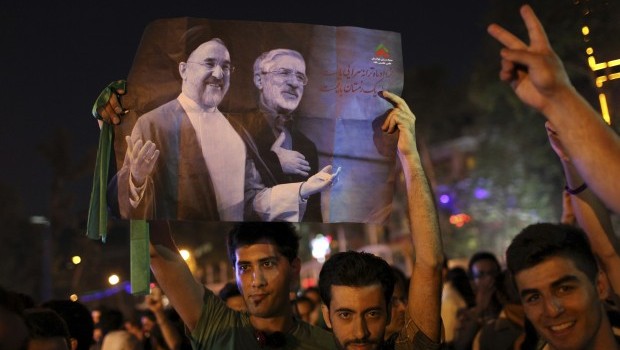
Iranians attend a street celebration, in Tehran, after their national soccer team qualified for the Brazil 2014 World Cup, after defeating South Korea, as they hold a poster of reformist former President Mohammad Khatami, left, and the Green Movement leader Mir Hossein Mousavi, who is currently under house arrest, on Tuesday, June 18, 2013 (AP Photo/Ebrahim Noroozi)
Khatami emphasized that it was this mass participation that led to moderate candidate Hassan Rouhani’s election victory in the first round of Iran’s presidential election of mid-June.
Former president Khatami, speaking in his home town to a group of reformist and moderate campaign members, said: “In recent years we had to deal with two very worrying parameters: fear and despair,” according to his official website.
Khatami painted a grim picture of the Ahmadinejad administration, saying the mismanagement and misconduct of this era brought the country to the verge of collapse, leading to a loss of hope by many of any chance of betterment.
“The destruction of the national economy and putting Iran in disastrous circumstances caused many to believe that the system would cease to exist if the current situation continued. Also many were fearful of foreign attack,” Khatami added.
The decision to participate or boycott the presidential election remained a critical dilemma for many reformists until just a few weeks, or even days, prior to the June 14 elections.
Khatami emphasized that despite the many criticisms he and his fellow reformists had about the situation in Iran, particularly following the disputed 2009 elections, they remained faithful to the Islamic Republic of Iran and its electoral process.
“Like any other political activists who seek to come to power, we never pursued this in any other path but via the ballet box,” Khatami stressed.
It is clear that since Rouhani’s election victory, Khatami and other reformists who were under direct or indirect pressure from the government, feel increasingly able to speak out and express their opinions.
The most pressing topic for both reformist and moderate supporters of Rouhani is his choices of ministers for the forthcoming government. A few days after the election, several ministerial shortlists were leaked to the media and circulated widely. The lists were full of well-known names who had served in the Hashemi Rafsanjani and Mohammad Khatami government from 1989 to 2005.
However, President-elect Rouhani has denied the content of any such shortlists, stressing that he has yet to make any final decisions regarding future ministerial appointments.
In another interesting development, former president Hashemi Rafsanjani has been warmly received in Mashad, the capital of Khorasan province in north-east Iran.
The manner in which the former president was welcomed at Mashad airport, and that large number of officials and clerics who met him during his visit, demonstrates a dramatic shift in protocol, if not power.
Over the last 8 years, following the clash between Rafsanjani and Ahmadinejad during the 2005 election, not to mention the former president’s implicit support for reformist candidates Mir Houssein Mousavi and Mehdi Karroubi in 2009, Hashemi Rafsanjani had witnessed a substantial shrinking in his power base, particularly within military and clerical establishments.
Now, the return of Khatami and Hashemi Rafsanjani to front-line politics in Iran is a clear sign of a possible resurgence of a trend towards less confrontational politics in Iranian domestic and foreign affairs, raising hopes of reducing Iran’s international isolation.
